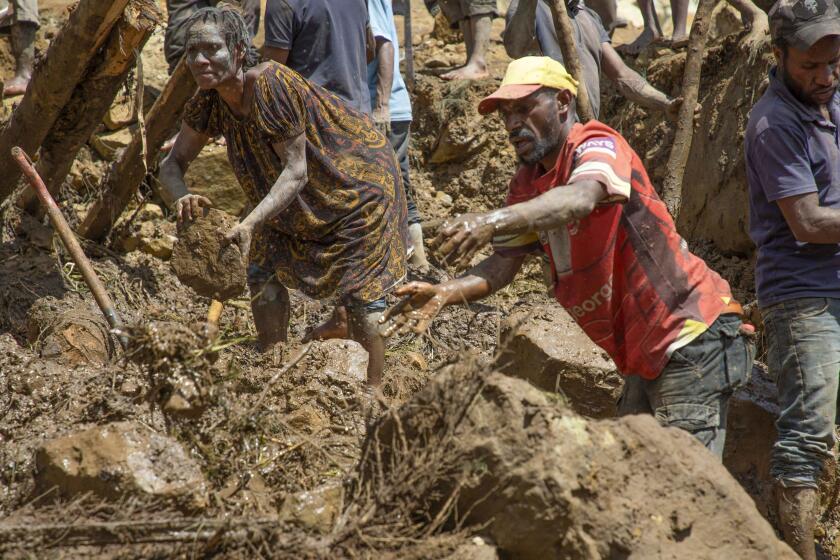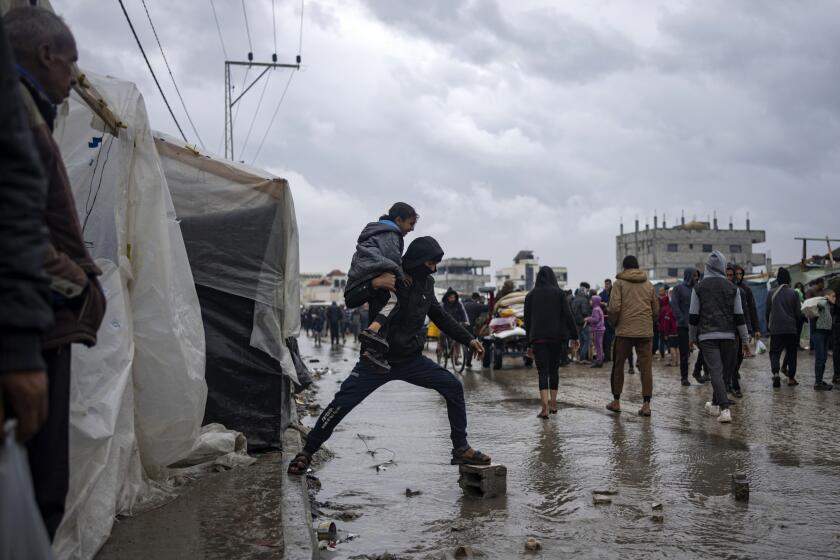War’s Casualties Include the Children of Reservists
There won’t be any Christmas on the Schmidtke farm this season. Never mind that the artificial tree has been up and decorated in the living room window for an entire year -- through the spring thaw and the lush summer, when the cats toppled it twice.
It’s there because Sgt. Dan Schmidtke promised his daughters he would take it down just as soon as he got home from Iraq. That was in January, when he left with the rest of the Army National Guard’s 142nd Engineer Combat Battalion. He isn’t back yet, and until he is, they aren’t about to let go of last Christmas, much less celebrate this one.
“I worry about his safety when I’m at school. I can’t sleep when my dad’s awake,” said Dani Schmidtke, 15, who decided she would rather live with a tree for a year than risk jinxing her father’s life.
The separation of war has fallen hard on the children of American soldiers, and perhaps none so much as the families of those in the reserves. This is the largest call-up of reserve forces since the Korean War, and unlike their active-duty counterparts, thousands of so-called citizen soldiers have left behind children caught between two worlds. Neither military nor civilian, they live outside the vast support network available at virtually every base and fort. Yet they represent an almost invisible minority in a public school system only recently aware that they exist.
Here in North Dakota, nearly half of the Army National Guard has been activated -- one of the highest per capita mobilization rates in the nation. Commitment to national service is known to run three generations deep. The rugged Plains individualism, which is legendary here, seems to be pulling families through. But virtually no one denies that the children are showing scars, some probably fleeting but others potentially indelible.
In and around Fargo, where the 142nd is based, teachers report falling grades and rising absenteeism. Some students have come to school in tears, others have turned to antidepressants to stop their nightmares (“I would have this vision of my dad running toward me, and he would just get shot and disappear.”) One high school junior, refused permission to visit his father and brother in Colorado before they left for Baghdad, dropped out of school and began taking methamphetamines. Another 13-year-old boy regressed to the emotional age of 7 in a breakdown so severe that his father came home.
North Dakota families tend to thrive. The divorce rate is among the lowest in the nation, the high school graduation rate among the highest. The experience of deployment has made some children stronger as they squeeze in homework between extra farm chores and learn to function on less sleep. Jordon Schmidtke, 18, balances the family checkbook. Holly Knutson, 16, mows the lawn. Many have, by their own accounts, grown up fast in the last 11 months.
“I guess I’ve been through a lot since Dad left,” Jordon Schmidtke said over pizza at the armory where her father came to train, more than half the rooms dark now and shut off from the heat. “I am a stronger person. I don’t really take anything for granted anymore.”
Nearly half of the American armed forces consist of reservists, civilians who give a weekend a month and two weeks a year to military service. In return they receive education benefits, retirement after 20 years and a monthly paycheck that goes a long way in places like this, where incomes are low, jobs are scarce but workers are scarcer.
Financial difficulty is not one of the hardships endured by North Dakota’s reservists. With hazardous-duty pay and separation allowances, most of them earn more in Iraq than they do in North Dakota, where the state unemployment rate is 2% and it is not unusual for people to work two or three jobs to get by.
But unlike an active-duty force composed almost entirely of soldiers under 25, the face of the reserve army is stable and more mature. According to National Guard statistics, as many as three-fourths are married; up to half have at least one child.
In North Dakota, that translates to more than 700 children left without a parent since two units rolled out in early 2003 -- a number bound to rise when 500 more soldiers deploy from the 141st later this month, Guard officials said.
Five of those children, ages 5 to 17, belong to Sgt. Cory Moor, a former Marine and devoted father who joined the Guard six years ago to earn a college degree. After the Sept. 11 terrorist attacks, Moor, 32, figured he would be summoned sooner or later, and so he and his wife, Jeanie, sat the kids down in the living room on more than one occasion and talked it over. When the call came, they were as ready as any family could be: strong-willed, close-knit and determined. Still, nothing prepared them for what was to come.
Jeanie Moor threw herself into volunteer work with the Guard’s family assistance program in Fargo. Appeals for help soared as families just like hers writhed under the 142nd’s hasty departure -- in just 72 hours they were gone -- and Moor’s volunteerism soon turned into a job that kept her on the phone long into the night. The distraction helped her forget her own emptiness, but left her children feeling all but orphaned.
“The day my dad left, my mom left too,” her 17-year-old daughter informed her one day.
Nine-year-old Jaron took it worst. A good-natured, affable kid, he turned angry -- “mouthy,” his mother said. His schoolwork fell from “excellents” to “satisfactories.” He complains of stomachaches and misses school. All the other fathers come to football practice. Where is his? he wants to know.
“He knows what his dad is doing is very important, but that doesn’t make it easier when he misses lifetime milestones,” said Moor, who has cut back her hours and sought family counseling. “His school has done very little to help. I really believe active-duty military have the easier time -- on-base support, peer support. Their kids’ best friend is a soldier’s son. But my son’s best friend? His dad still comes home every night.”
None of the institutions usually equipped to assist children seemed prepared for the largest and longest reserves deployment in 50 years. The National Guard is working full-tilt to transform volunteers -- once charged with organizing monthly potlucks -- into support groups to shore up frightened and splintered families. Family assistance centers are opening all over the country, five in North Dakota since June, a response to the military’s concerns that long separations could exacerbate an already looming retention problem.
In the civilian world, meanwhile, public schools are discovering a new subpopulation of troubled students with parents and siblings at war.
“One of the most underreported facts nationally is how this has affected children. It has been overwhelming in terms of sheer numbers,” said Linda Engelman, a trained counselor and the lead volunteer for the North Dakota National Guard family programs. “Do we need more people? Yes.”
In Fargo, which experts believe is emblematic of the nation at large, the results of outreach efforts have been spotty.
While Moor’s son has received little assistance in the suburb of Casselton -- where only five Guard soldiers in a civilian community of 1,200 have been deployed -- some in other area public schools saw an impressive level of attention almost from the start.
Fargo public school officials, National Guard leaders, community organizations and the local newspaper banded together to form on-campus support groups, alert teachers, bring in psychologists and line up child care, said Lowell Wolff, assistant to the superintendent in Fargo. Even the area’s large Kurdish refugee population was tapped to explain the horror of life under Saddam Hussein.
As a result, teachers and counselors at Agassiz Middle School know by name all eight students who have a family member deployed. A video starring each of the eight, depicting “a day in the life” of the child waiting at home, is being produced by student body leaders and financed by the PTA. Students recently paid $1 each for the privilege of wearing to school otherwise-forbidden hats, the proceeds going to families with soldiers.
But at Thomas Jefferson Elementary just a few miles away, such organized outreach is almost nonexistent. At least 16 of 284 students have a family member deployed, but they are virtually lost in an ocean of competing needs as teachers and a lone counselor struggle to assist a far greater number of students plagued by poverty and parental neglect.
“Jeremy is depressed,” counselor Laura Seabold said of one fourth-grader, identified by his first name only, whose father is a reservist overseas. When he came to class one day wearing a T-shirt that said, “My dad is in the 142nd,” she invited him in to talk.
“His is an emptiness that can’t be filled. He’s very mad at the government for making his dad go. He has his ups and downs when it comes to behavior, but it’s improved in the last month, now that he knows his dad is coming home” in April, Seabold said.
In some cases in the Fargo area, the problems of separation have shattered families so thoroughly that fathers have been called home.
“From the time we got the call, it was like we weren’t a family anymore,” Christie Peterson said over a plate of cookies she didn’t touch at the armory one recent afternoon.
When her husband and son, Sgt. Alan Peterson, 52, and Spc. Joshua Peterson, 23, deployed last year, her already troubled youngest, Jared, now 18, sank into despair. Denied a chance to visit them during training in Colorado, Jared dropped out of the 11th grade. Valuables began to disappear from the house. His mother discovered he was using methamphetamines.
At one point he put a gun to his head and threatened to use it.
“When I left, the whole thing fell apart,” said Sgt. Peterson, a full-time Guard technician and mechanic with 30 years of service. “He’s been volatile at times, but since I’ve been home, it’s been great. Now he’s looking for a job.” Peterson is scheduled to go back to Iraq after Christmas; his wife isn’t sure what will happen then.
“There’s not much we can do,” she said, sounding tired. “It’s his job.”
Much as children can be torn between the civilian and military worlds, so can their soldiering parents. Sgt. Rollie Greuel, 45, was told by doctors that his son Mike, now 13, probably would not survive a separation.
Having lost his mother at age 7, Mike feared he’d lose his father too. Diagnosed with attention deficit disorder, Mike was a “two-parent kid,” so his father placed him in the care of his sister and her husband and hoped for the best.
This war was, after all, precisely why he joined the Guard 22 years ago -- not for the education or the money, but for the chance to fight for his country. In Iraq, he flourished; while the work pace in the searing heat was 10 minutes on and 50 minutes off, he sometimes worked right through.
Back at home, his son fell apart. He regressed emotionally to age 7, sat in his room and said he didn’t want to live. At school, he didn’t function. At church, he climbed under the pews.
Greuel came home on emergency leave and Mike improved. They spent all of August together, and Mike’s medication was adjusted. Believing his son was stable, he left for Baghdad to finish his tour. It was a Sunday morning; Mike said goodbye at the airport, then cried all the way home. At church that day, he scurried back under the pews.
Home again now, probably for good, Greuel is clearly conflicted.
“Yes, I wish I was there,” he conceded over a hot dog one day after finishing work at the sunflower seed factory, where his mind regularly wanders off to Baghdad. “You have your family at home and your Guard family. You can’t live with somebody nine months and not form some pretty deep friendships.”
But when he was over there, his mind was always wandering over here. So, he said, was everybody else’s.
“Most of us didn’t worry about the guys with rifles and RPGs trying to shoot at us over there,” he said. “It was always, ‘I just missed my son’s graduation, his first football game.’ Retention is going to be horrible. Families are not complaining, but this is tearing them apart.”
On the Schmidtke hobby farm -- Schmidtke makes a living as a welder of farm equipment -- there is a lot of support from neighbors, even if the nearest one is a mile away.
Still, Dani and Jordon are the only students in their school with a deployed parent. Nobody understands what it is to miss hearing their dad sing in the morning or scarf all the macaroni and cheese, to “fill his boots” around the farm, as Dani put it. They get up at 5 a.m. -- two hours earlier than before -- to do the chores he managed to do in a third of the time. The antidepressants helped stop the nightmares of his death that plagued them both. “We just have good dreams now,” Dani said.
Things are beginning to look up. If they believe the military, which has been wrong about a dozen times before, their 41-year-old father will be home in time for Jordon’s high school graduation. He’ll find two faces more mature, a ponytail that’s lighter, an extra dog and one pretty terrible report card.
But what’s changed the most? His wife, Alanna, answered without pause:
“Us.”
It’s been a challenge, but a good one, she said.
“It’s taught our family we can do things we never thought we could do. And however long it takes, we’ll be here when he gets home.”
And then they’ll have their Christmas.
More to Read
Start your day right
Sign up for Essential California for news, features and recommendations from the L.A. Times and beyond in your inbox six days a week.
You may occasionally receive promotional content from the Los Angeles Times.






